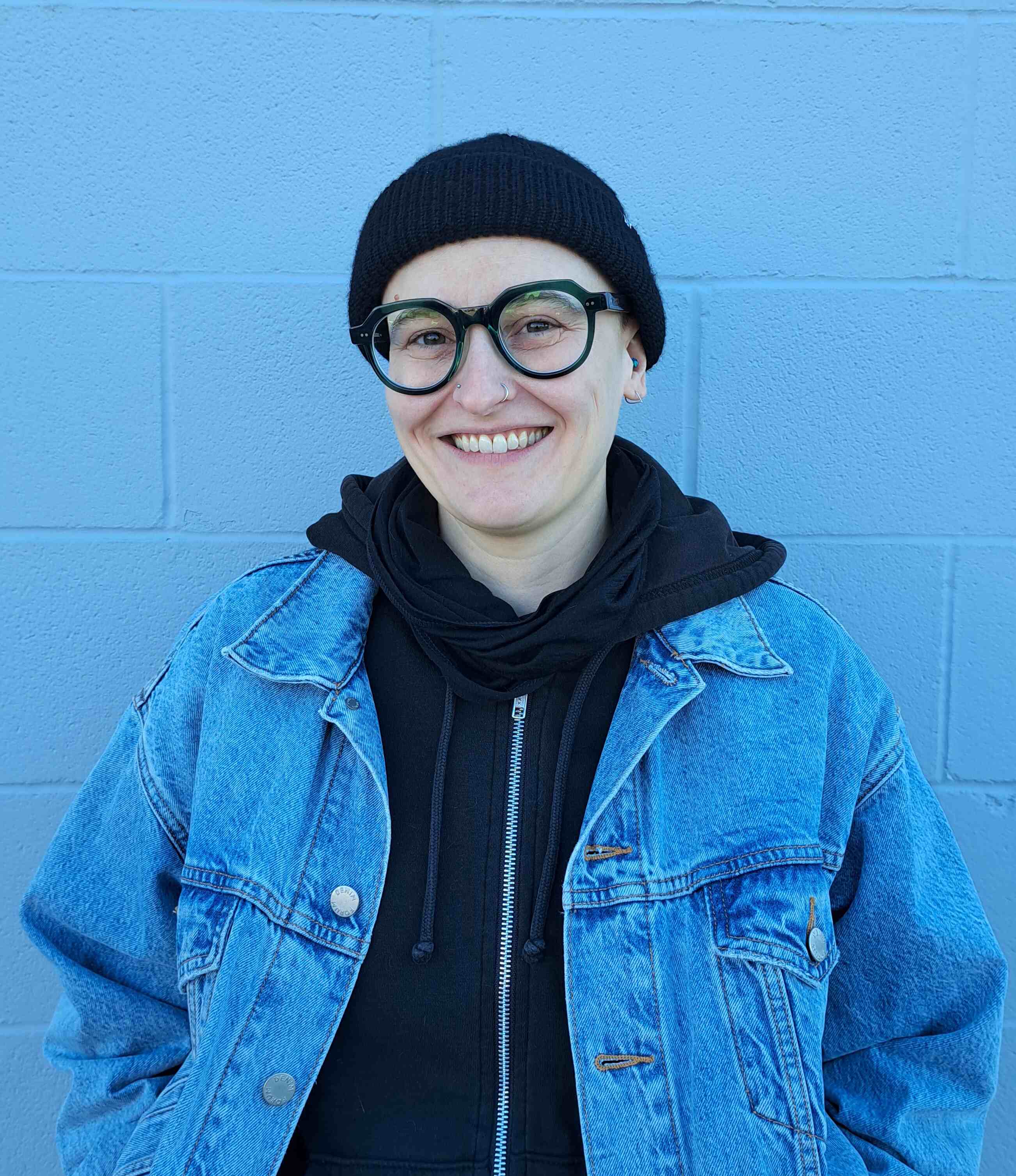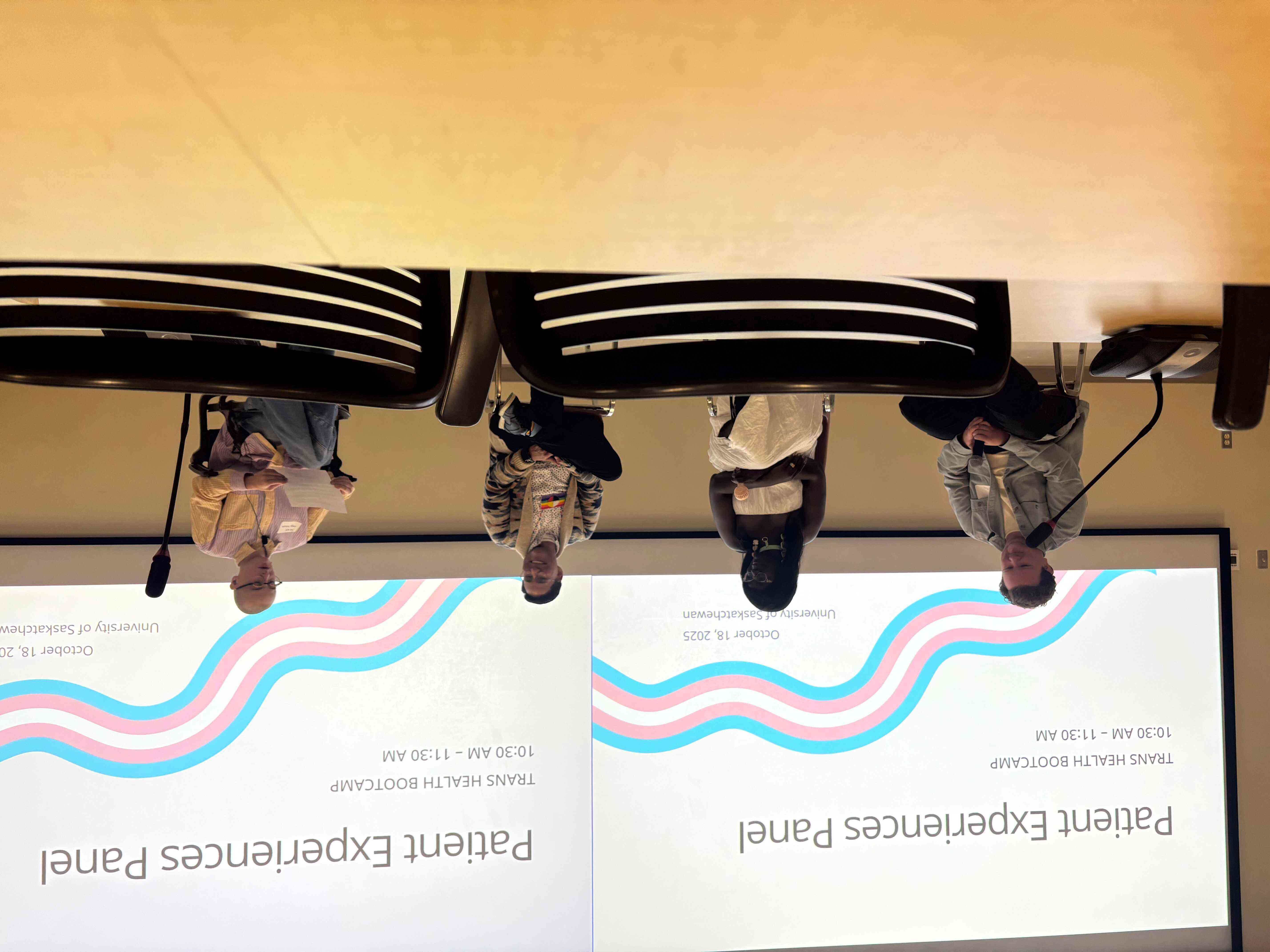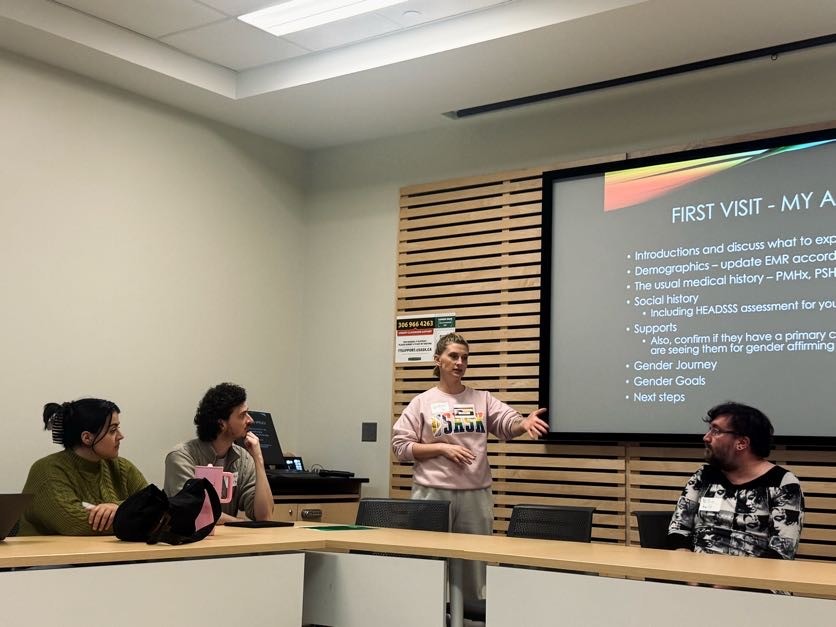
Challenging Disparities: MD Student Advocates for Queer Health Equity
Jess Klaassen-Wright (they/them), MD Class of 2027, is an advocate both nationally and internationally for queer health in Canada. Recently, they helped organize the Trans Health Bootcamp that took place in Saskatoon on October 18, 2025. The bootcamp was funded by the Social Accountability Lab for Learning and Teaching (SALLT) Fund. Klaassen-Wright sat down to talk about how they became involved in the initiative, and the success of the day.
By Wren MynhardtJess Klaassen-Wright (they/them), MD Class of 2027, is an advocate both nationally and internationally for queer health in Canada. Looking at what started their involvement, Klaassen-Wright shared, “A big thing for me coming into medical school as a queer, particularly a genderqueer, student is that it felt really isolating. In my class, there are no other genderqueer folks that I know of. It felt a bit shocking to me, especially since I’m in spaces that are very gender diverse outside of school and come from a diverse family. I felt I couldn’t connect with a community. I went looking for more queer communities and that inevitably meant creating some of it.”
Klaassen-Wright identifies as queer and genderqueer and is a white settler that lives on Treaty 6 Territory. Before starting their medical journey, they completed an undergraduate degree in English Literature at the University of Saskatchewan. After graduating, Klaassen-Wright spent time as a freelance editor. They also worked as a support worker at the Lighthouse, a supported living facility that has since been acquired by new ownership and transitioned into the Mustard Seed.
Klaassen-Wright was drawn to medical school for a number of reasons, among them being their experience at the Lighthouse, and a reflection on the world around them and how they might make a difference as a health care worker. In their studies, they shared, “I have varied interests in the health world and 2SLGBTQIA+ health. Also in addiction healthcare, mental healthcare, harm reduction, and weight bias in medicine.” It was their interest in queer health that led to them becoming an active member in their community.
“There had been a queer student group previously before I arrived,” Klaassen-Wright explained. “There was a mentorship program, but it wasn’t active. I reached out to upper year students and ended up stepping into the role of coordinating it in my second term of medical school. Connecting with the college mentorship folks in upper years meant that I also learned about CQMSA [the Canadian Queer Medical Students Association]. It’s a national group of queer and allied medical students who work toward improving the landscape in medical education for queer students and working professionals. I stepped into the role of steering committee representative for the College of Medicine.”
Their work in national movements is what made Klaassen-Wright aware of the Trans Health Bootcamp and motivated them to help host one in Saskatoon. “The idea for the Trans Health Bootcamp came from a group of students at McMaster University. The organization is called TREC [Trans Resource & Education Committee]. TREC did a bootcamp in December 2024. One of the folks from CQMSA was involved and came to the steering committee asking to do it as a larger initiative such as having it at other schools or doing a national event.”
Klaassen-Wright set to work, stepping in to join the planning committee to host the next Trans Health Bootcamps. Students from all over Canada joined the initiative, particularly from the University of Toronto, Western University, and the Université de Montréal. The national Trans Health Bootcamp took place on October 16, a major success. Following this, Klaassen-Wright helped host a second Trans Health Bootcamp locally in Saskatoon on October 18. Their goals were straightforward: “I wanted to increase knowledge about trans healthcare in the province but also to give students some more hands on experience rather than only didactic lectures. Also, I wanted to include community members in the education.”
In order to put everything together, Klaassen-Wright received funding from the Social Accountability Lab for Learning and Teaching (SALLT) Fund. They then worked closely with the Division of Social Accountability (DSA) and the Clinical Learning Resource Centre (CLRC) at the College of Medicine. The end result was a successful day-long event to which students from medicine, nursing, pharmacy, rehabilitation sciences, public health and epidemiology, and general health sciences were invited. The bootcamp began with a cultural opening led by Jack Saddleback. Saddleback performed a smudge and spoke about gender and the role of gender diversity in Indigenous culture. It was followed by a panel with three community members who spoke about their experiences in the healthcare system in Saskatchewan. After a shared lunch, the bootcamp hosted three rotating sessions.

“One rotating session spoke about binding and tucking, the tools to do it, safety concerns, and how to speak to patients about it,” Klaassen-Wright outlined. “Another session focused on hormone prescribing, and hormone therapy and how it works. The last session was a conversation on how to talk to patients and assess where they are in their transition journey such as their transition readiness. Two of the sessions had simulated patients. Students got to practice interactions with a community member.” They went on to add, “Overall, folks enjoyed it and wanted it to happen again. I’m hoping to continue for next year and the following years.”

Reflecting on the event, Klaassen-Wright shared, “The big takeaway is that we need more general practitioners who are willing to learn about trans healthcare. It’s simple, no more complex than providing care for folks with diabetes, something that family doctors do all the time. Physicians see a big black box and think, ‘I can’t deal with this patient because they’re trans and that means I can’t provide any care at all.”
When asked about any resources they could share on queer health that they’ve found helpful, Klaassen-Wright provided the following: “CQMSA has really good resources on their website including gender care guides for many provinces and territories. They give an overview of local queer and trans healthcare, medication and surgical options, and providers, as well as name change info. There is also information for preceptors who are working with students on how to make safe and supportive spaces for queer learners. Rainbow Health Ontario has good resources for physicians who want to learn more about queer and trans health. Absolutely folks should know about the Trans Health Navigators in Saskatchewan. Especially if you have trans patients and are unsure of what resources to put them in touch with. The Trans Health Navigators know everything about trans healthcare in the province.”
To wrap-up our interview, Klaassen-Wright was asked if there were any last thoughts they would like to share: “We need more access to transgender diverse healthcare in the province,” they said. “It’s easy to learn how to provide that care. You don’t need to be a specialist to work with trans patients, particularly if they are coming to see you about something unrelated to their gender identity. Remember, if someone is there to see you about a broken arm, they are really there to see you about their broken arm. You don’t need to know the whole history of their trans identity to put their arm in a cast. Just spend some time educating yourself and you’re going to open up a whole world of care.”
Klaassen-Wright would like to give special thanks to the following: Carlyn Seguin, Cassandra Opikokew Wajuntah, Elijah Gatin, Joelle Schaefer, Kate Herriot, kēr, Lise LeBlanc, Kristina Hughes, Mateya Olszynski, Megan Clark, Natalya Mason, and Tye Strachan. Volunteers and speakers Aly Antaya, Gillian Treen, Jack Saddleback, JB Berenbaum, Jemma Martens, Nillin Lore, and Srini Correa. Thanks also to all attendees and to the Division of Social Accountability and the Social Accountability Lab for Learning and Teaching (SALLT) Fund.
Recommended Resources:
